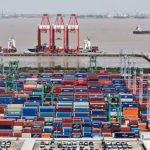
China’s Aggressive Anti-Corruption Drive Transforms State-Owned Sector Dynamics
China’s relentless crackdown on corruption is reshaping the leadership landscape of its state-owned enterprises (SOEs), with a surge in executive turnover marking a significant shift in the country’s corporate governance dynamics. The latest data reveals that China has replaced a remarkable number of top executives at state-owned companies this year, signaling a concerted effort to cleanse what Beijing considers critical sectors of graft and inefficiencies.
The aerospace and defense sectors have been particularly targeted, with key players like China Aerospace Science and Technology Corp. (CASC) witnessing a wave of leadership changes. Chen Mingbo’s appointment as chairman of CASC underscores the government’s determination to instill discipline and political loyalty within these strategic industries. Emphasizing adherence to Communist Party guidance, Chen’s remarks during a recent inspection highlight the prioritization of political reliability in key positions.
This sweeping purge extends beyond aerospace, encompassing other vital sectors such as telecommunications and energy. Executives from rival companies are being brought in to inject fresh perspectives and foster collaboration among industry players, aiming to enhance efficiency and competitiveness.
In telecommunications, the appointment of He Biao, a former executive at China United Network Communications Group (China Unicom), as the president of China Mobile, signals a strategic move to accelerate the deployment of 5G infrastructure and pave the way for future technologies like 6G. Similarly, in the automotive sector, efforts are underway to address technological gaps through leadership transitions, with a potential merger between China FAW Group and Dongfeng Motor on the horizon.
The government’s intensified focus on anti-corruption measures reflects broader ambitions to revitalize state-owned sectors and bolster China’s economic resilience. Despite their centrality to the economy, state-owned giants have faced profitability challenges, prompting calls for greater efficiency and innovation.
As China’s anti-corruption campaign gains momentum, the ramifications are reverberating throughout the corporate landscape, underscoring the government’s commitment to transparency, accountability, and economic rejuvenation. The evolving leadership dynamics within state-owned enterprises signal a pivotal phase in China’s ongoing quest for sustainable growth and global competitiveness.






![Pakistan accuses the TTP of carrying out attacks on its territory and the Afghan Taliban government of harbouring the group [File: Fayaz Aziz/Reuters]](https://asiandiplomacy.com/wp-content/uploads/2025/10/2023-02-27T041341Z_1777986366_RC2O7Z9GI1FB_RTRMADP_3_PAKISTAN-BLAST-POLICE-1760256429-150x150.webp)